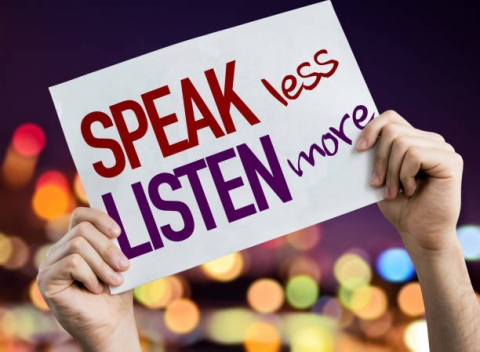Do you talk more and listen less? - 5 tips to improve your listening skills
"There are more advantages than disadvantages for this project but there are many risks involved. Hence, we cannot step in unless we do risk analysis first. What do you say dear colleagues?" Rajesh spoke after waiting fifteen long minutes impatiently to give out his opinion in a board meeting. There were six more members in the meeting room and everyone was startled. Not because Rajesh spoke in a loud voice or mentioned something interesting. But simply because one of the board members had already said the same thing just a couple of minutes back. Rajesh hung his head in shame after he realized his silly mistake in the eagerness to speak. He realized that all the time others were speaking, he was involved in what point to make and how to give his opinion that he did not do the most important thing in communication. Yes! That crucial part of communication is "#Listening".
More often than not, we all behave just as Rajesh did. We talk more and listen less. While doing that, we often forget that the key for any #communication is receiving the information the speaker is providing. We do not learn from talking. We learn from #listening. Active listening is a crucial part of the learning process. Hence, here are 5 tips for you to improve your #listening skills.
- Make an effort to be an #activelistener- Most of the times, we listen to respond. However, active listening means listening to understand. Active listening involves the following:
-
Making eye contact with the speaker
-
Listening to understand and making notes if required
-
Give understanding notes
-
Make a note of your questions to ask at the end
-
- Put all your #unconsciousbiases Our judgments and preconceived notions are the biggest barriers to receiving any information. As soon as the speaker starts speaking something we already know, our chain of thoughts proceeds to so many things we assume, know, or feel. Most of all we stick to our own biases that we developed over some time. Improving listening skills is possible only if you keep these biases aside.
- Pay attention to body language - Information is not always given through words. Sometimes, it is also the non-verbal cues that give hints if you are bored or listening actively. At the same time, the speaker too has a body language that communicates with the listeners. If you observe keenly, the tone with which the speaker says anything stresses a piece of information, etc are very important.
- Suppress your excessive anxiety to speak or give your opinion - Stay calm and relaxed when you sit down for a conversation, meeting, seminar, or even a training session. A calm mind is more receptive to information. Remind yourself that people listen to you only if you listen when others speak. Do not be too anxious to give out whatever information you know, just to show you are knowledgeable.
- Practice, practice, practice, and practice - Like any other skill, listening also needs practice. Make active listening a part of your life. Be it communication with your life partner, children, helpers, or colleagues, the same principles apply to all these. Empathize with the speakers. This also helps you become an approachable person.
Remember that communication is a two-way process. The more information you receive, the more you can give when in need.













